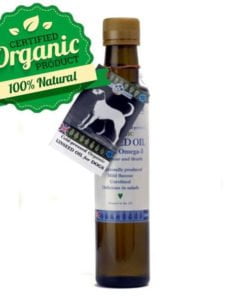Subtotal: £16.80
Linseed for the Health of Dogs

Cold-pressed Linseed Oil & Milled Linseed for the Health of Dogs
Flax Farm specialises in producing linseed (flax) We produce a range of cold-pressed linseed oil for and milled linseed for your horses, dogs and other animals including chickens.
- Flavour – dogs enjoy it
- Optimal nutrition – better omega-3 levels; better for your dog
- Pressed by us in West Sussex, we use it ourselves so you know you are getting the best
Cold-pressed linseed oil
Cold-pressed linseed (flaxseed) oil is simply pure unrefined cold-pressed oil that has been gently squeezed from the best UK-grown linseeds and delivered fresh from pressing. Careful production, the highest standards of quality control and freshness mean the oil is in pristine condition with maximum nutritional benefit and a mild flavour your animals will enjoy. Cold-pressed linseed oil is an excellent way to feed omega-3 to animals and birds. Modern feeds for all animals tend to have raised the levels of omega-6 in their diets so they need omega-3 for essential balance and health.

Cold-Milled Ground Linseed
Ground linseed is whole linseed freshly cold-milled. It contains virtually no available starch or sugar, it is a rich source of omega-3, fibre and protein. It is easy to feed and being fresh is very plateable. It is a useful food for older and diabetic dogs.
Why linseed can be so beneficial in your dog’s diet
Just like people, in recent times, dogs’ need for omega-3 has increased because of changes in modern agriculture. Dogs’ wild wolf ancestors ate the diet they had evolved over to eat, wild animals that grazed naturally and so they got a perfect balance of omega-3 to omega-6.
The modern dog’s food contains grains and meats which are higher in omega-6. Linseed oil added to their food will add omega-3 and can improve the balance of fats in their diet.
The dogs here really do enjoy our Linseed Oil, but here is why we like it too:
- Omega-3 an Essential Fatty Acid
- Healthy Skin and Glossy Coat
- Puppies
- Adult Dogs
- Working Dogs
- Breeding
- Older and Geriatric Dogs
- Dogs and the Budwig Diet
Omega-3 is an Essential Fat
Omega-3 is an essential building block in every cell in the body. Omega-3 is as essential to the dog’s health as protein and minerals like calcium and iron. Like these other nutrients, dogs can’t make omega-3 in their body so it must be given to them in their diet.
Healthy Skin & Shining Coat
For a long time, cold-pressed linseed (which is also known as flaxseed oil) has been fed to top show dogs for an eye-catching lustrous sheen. We all instinctively know a glossy coat is a sign of underlying health and that is why so many people with a pet or working dogs feed linseed oil.
Omega-3 Naturally
Linseed is one of nature’s richest source of omega-3 so feeding cold-pressed linseed oil helps to provide essential balance. It is natural and unprocessed.
Puppies
Giving puppies a good diet with the correct balance of omega-3 gives dogs a good start in life.
Adult Dogs’ Health
Linseed oil is unlike “supplements” as it provides omega-3 which is essential for health; it’s not an add-on, it’s a basic, just as protein, calcium, iron etc are essential basic bldy building blocks. The nutritional imbalances in modern dog foods is associated with many metabolic disorders and inflammatory diseases show in adulthood. These are characterised by conditions similar to those we see in people: autoimmune deficiency disorders; muscular-skeletal problems, arthritis, ligament and tendon inflammation; skin problems, itching, scurfy or dry skin; temperament problems, aggression, anxiety, hyperactivity; digestive disorders, food intolerance, colitis, diarrhoea; cancer; metabolic disorders. Increasing the levels of omega-3, which is an essential nutrient that we know is deficient in the diet of most dogs, can be the start of a better, healthier diet which can help prevent and even overcome these conditions.
Older and Geriatric Dogs
Just like people with stiff joints older dogs can really appreciate the addition of linseed oil in their diet. A little linseed oil in your dog’s diet can help keep a bit more of spring in his step and gloss on his coat.
Dogs even with the most sensitive tummies, usually tolerate Flax Farm Cold-Pressed Linseed Oil well. Ground linseed contains gentle fibre that can help support dogs’ digestion system to keep them comfortable and regular.
Working Dogs
Omega-3 is a great addition to the diet of working dogs. Keeping that balance of omega-3 is important to support them working hard. Ideal for all working dogs.
Breeding Dogs and Bitches
Omega-3 is necessary for healthy development in puppies. It is a necessary component of bitches milk, feeding linseed oil before whelping – even before mating – will help top ensure the puppies get omega-3 before birth and while growing. It can be fed to pups at weaning when going onto solid food. weaning.
Budwig diet: Flax Oil-Cottage Cheese diet for dogs
Dr. Johanna Budwig, a German biochemist researcher into dietary fats discovered the importance of omega-3 for health. Johanna Budwig research led her to understand the role fats, especially omega-3 have in the diet. Flax Farm cold-pressed linseed oil and linseeds (which are to be ground) are essential for the Budwig diet and the mild flavour makes is nice for even fussy dogs. The Budwig diet is a great way of getting all the benefit of linseed into your dog’s diet so can be of benefit to skin, coat, joints and digestion. It is also a useful way to feed linseed for older dogs.
How to Feed Linseed to Dogs
Feeding Flax Farm Cold-Pressed Linseed Oil to dogs is easy because it has such a mild flavour that most dogs usually really enjoy it. Just stir the correct quantity (see back of the container) into usual food. Some dogs prefer the capsules wrapped in bacon or cheese as a treat.
NUTRITIONAL ADVANTAGES OF LINSEED OIL V OTHER OILS
Horses and Ponies need both omega-3 and omega-6 fatty acids, they are essential building blocks for healthy cell development. These fatty acids have to come from food because, like minerals and protein, animals cannot make them in their body. Their natural diets contain a balance of one part omega-3 and two parts omega-6. However most major ingredients in horse feed including oats, wheat, maize and soya have a lot of the omega-6 which is inflammatory and in addition, many people feel other vegetable oil which further unbalances horses’ metabolism. This means can’t get enough of the anti-inflammatory omega-3 to provide the essential balance for healthy cell and hormone production. All horses, especially those in hard work, breeding animals, old or young stock need extra omega-3.
Linseed oil is the only vegetable oil which has more omega-3 than omega-6, so it is the only oil that can rebalance the diet. Other vegetable oils make imbalance worse and can result in stiff joints, scurfy itchy skin, poor attention, spookiness and other typical symptoms of fatty acid imbalance.
All Vegetable Oils are not the same!
Why Linseed Oil is the only vegetable oil you can feed to rebalance the fats in your horse’s diet:
| Source of Fatty Acids | Omega-3 | Omega-6 | Rebalancing or Unbalancing | |
| Maize/Corn Oil | 0 | 59 |  |
Very unbalancing |
| Soya Oil | 7 | 50 |  |
Very unbalancing |
| Rapeseed Oil | 7 | 30 |  |
Unbalancing |
| Olive Oil | 0 | 8 |  |
Unbalancing |
| Sunflower Oil | 0 | 65 |  |
Very unbalancing |
| Typical Vegetable Oil | 1.5 | 57 |  |
Very unbalancing |
| Flax Farm Linseed Oil | 60 | 14 |  |
Re-balancing |
This table shows why sunflower, corn, olive, rapeseed and soya oils do not do the same job as linseed oil. All these other vegetable oils should be thought of as just additional calories for your horse’s diet. If these oils are fed additional linseed oil should always be fed to provide natural balance the horse would get in the wild from grazing natural grasses and herbs .
Cod-liver and blended fish oils are good sources of omega-3 but are not a natural food for horses. (There have been enough scares due to pollutants in the ocean and to feeding unnatural foods to livestock; we don’t need to feed horses fish).
How to use: The simplest way to use the Flax Farm Cold-pressed Linseed Oil is simply to mix it in food fresh every day. Unlike the whole linseeds the linseed oil does not need to be cooked, in fact the cooler you can keep it the better.
How much to Buy
- For owners with a single horse or pony: buy our 2.5litre can
- For owners with a larger horse (or on special diet): buy our 5 litre can
- For owners with several horses: buy our 4 x 5 litre cans or 25 litre container.
- For riders: try our cold-pressed linseed oil or capsules
How much to Use:
The amounts given are for normal healthy maintenance. More can be fed as directed by your vet or other animal health professional.
- For 15-16 hands/ 1.5-1.6m. Mix 3 tablespoons/45-50ml added to feed; for smaller or larger animals feed pro rata. Foals, young stock, pregnant and lactating mares can be fed up to double.
Storing Linseed Oil:
- Store linseed oil in a cool dark place and try to finish within three-four months. Don’t throw away any unused linseed oil: it is good for treating woodwork.

 Cold Pressed ORGANIC Linseed (flaxseed) Oil for Dogs - 500ml
Cold Pressed ORGANIC Linseed (flaxseed) Oil for Dogs - 500ml